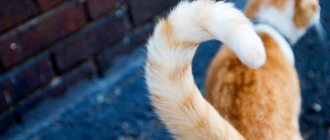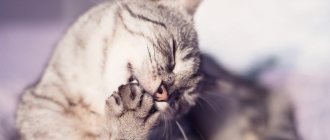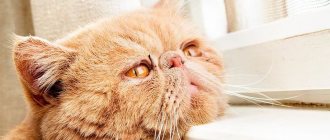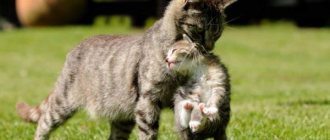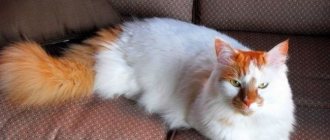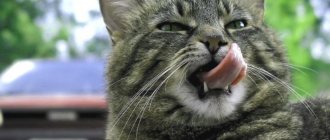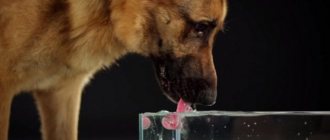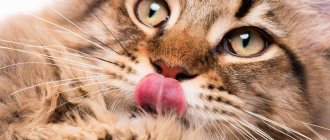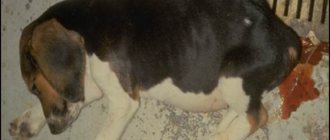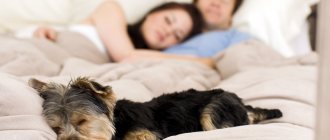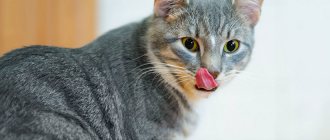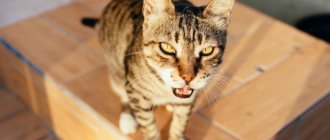11159Administration
When an animal is eating consistently but not gaining weight, pet owners sound the alarm. Many people believe that if a cat eats, then weight gain is a natural process. This is not entirely true. Animals, like people, are active and dynamic, which burns extra calories and helps the pet lose weight. When a cat loses weight but eats well, this is normal. With active life, weight loss is ensured by normal metabolism. The situation is different with sedentary cats.
Don't expect your kitten to actively gain fat. During the first 9-11 months, kittens develop their skeleton and posture, and the baby gets fat and loses weight. Young cats and female cats become soft and plump 1-2 years after birth.
© shutterstock
Physiology
At different periods of its existence, a cat moves differently. The resulting calories from a small kitten are spent on the growth of bones and muscles; the remaining calories are required for play.
The body of older cats may dry out due to age and for some other reasons, including:
- illnesses and stress;
- lack of vitamins;
- lost teeth;
- parasites.
Owners of older cats should closely monitor their condition and take them to the veterinarian if necessary.
The dangers of excessive fattening
For those owners who want to fatten their pet for their own aesthetic needs - to admire how funny the cat licks or runs - it is useful to learn about the consequences of feline obesity. Since obesity in cats, like in humans, is a disease, a fat cat will sooner or later face health problems, including:
- Diabetes of the second type - being initially not prone to diabetes, your pet can develop it with an incorrect lifestyle and, in particular, nutrition. As a result, the owner will have to periodically inject insulin into the cat in order to avoid a sharp deterioration in his health; Diabetes is one of the most dangerous consequences of overfeeding a cat.
- Cardiovascular diseases - the higher the weight of the animal, the greater the load on the heart. Overweight cats, as a rule, rarely move and prefer a recumbent lifestyle, which only aggravates the situation; Gaining excess weight is fraught with heart attacks leading to heart attack
- High probability of joint injury - any long-distance jumps can result in dislocations, or, in the worst case, fractures. Since the bones and joints of each cat are tailored to a certain body weight, which has its own threshold, going beyond its limits is fraught with all sorts of injuries; Overweight cats have a more difficult time recovering from fractures due to the heavy load on the joints.
- Predisposition to arthritis. Fat animals are the first at risk in terms of the likelihood of becoming acquainted with this unpleasant disease, accompanied by inflammation of joint tissues and deformation of the limbs, not to mention purulent complications; In advanced cases, arthritis can only be treated with a surgical scalpel
- Hypertension - this disease is difficult to diagnose in the initial stages, but its harm to the entire body is very great. In its chronic form, hypertension leads to hypertrophy of the heart muscle, which, with the least favorable prognosis, ends in cardiac arrest.
Keep in mind that a deviation of one and a half kilograms from the norm is already considered obesity and unsafe for the pet’s health. Since pets differ significantly from us in size, they only need to gain a few hundred grams for this to become noticeable. You can read about the process of losing weight in cats on our portal.
Video - Consequences of obesity in cats
Why is my cat losing weight but eating well?
The subcutaneous fat layer is thin.
At stage 2, you need to pay attention to the general condition of the animal, its age and consult a specialist. If this stage is missed and the cat is already exhausted, it requires serious treatment.
An animal can lose weight for physiological and pathological reasons.
In the first case, usually no correction is required, in the second, the animal needs to be treated. You will have to focus on finding out the causes of weight loss and eliminating them.
The subcutaneous fat layer is thin.
articleTheodora11 months ago
Immediately after birth, the body's systems have not yet matured and learned to work at full capacity. That is why any minor violation can lead to serious consequences. A thin kitten is not such a rare occurrence, often leading to developmental delays and death of the animal. For what reasons can a baby develop malnutrition?
Moreover, not only is the kitten very thin and not getting better, but other symptoms are added to this. If you observe lethargy, fever, purulent discharge from the eyes and nose of the animal, vomiting, diarrhea, ulcerations on the mucous membranes - most likely this is an acute viral or bacterial infection.
This explains why the kitten eats poorly or refuses to eat at all. Lack of appetite is accompanied by a rapid deterioration of the condition - the baby stops playing, and his body temperature approaches 39°C and higher. Unfortunately, in this case there is a very high probability of death.
Symptoms can develop rapidly, quickly leading to serious illness and even death. That is why, with any manifestations of exhaustion, especially if it is accompanied by other signs, the pet needs to be helped.
The diagnosis can only be made by a veterinarian after examination, temperature measurement and ordering a number of tests, which may include blood tests, stool tests, smears for polymerase chain reaction, and rapid tests for some infectious diseases.
Only after finding out the cause can we consider the possibility of full treatment of the animal; before this, a severely exhausted baby can only alleviate the condition with the help of infusion therapy and the introduction of nutrient solutions.
This is also a very important point, since nutrients in a small body quickly deplete their reserves, blood glucose drops sharply and can drop to critical levels, which is dangerous for the animal’s life. The answer to the question why a kitten is thin and does not get better may turn out to be much more serious than it seems at first glance. Since all processes in babies develop faster than in adults, you should not postpone treatment until later.
The first and main reason for a cat’s refusal to eat and sudden weight loss is the presence of a source of inflammation or another disease. Therefore, such a condition can be regarded as a symptom that requires special attention. The reasons for an animal’s refusal to eat food or water are divided into psychological and medical.
Psychological factor
If the basis is a psychological factor, then appetite is completely absent. This may happen for the following reasons:
- moving to another place;
- change of owner;
- the appearance of a new person in the environment;
- change of diet.
Medical factors
The body may experience inflammatory processes, disturbances in the functioning of internal organs, and blood diseases. Painful and unpleasant sensations also affect lack of appetite and refusal to eat. Such reasons are cause for concern and immediate contact with a veterinarian.
It is important to understand that there is a difference between medical and psychological causes. So, in case of ill health, the following symptoms are added to the lack of appetite:
- salivation;
- lethargy;
- slow reactions;
- lack of mobility and desire to play;
- difficulty or heavy breathing;
- discharge of pus;
- nausea and vomiting;
- change in habitual behavior.
Gastrointestinal problems and other diseases
Such symptoms may indicate problems with the gastrointestinal tract - indigestion, poisoning, an allergic reaction to a feed component, pancreatitis, problems with internal organs.
Without careful observation and the necessary examinations, it is very difficult to determine why a cat is losing weight. If we delve into the list of cat diseases and their symptoms, we will immediately notice that weight loss can be a sign of many diseases.
These are, in particular, diabetes, leukemia, inflammation of the intestines, diseases of the kidneys, liver or upper respiratory tract, neoplasms, parasites or dental problems... And this is still an incomplete list of possible reasons for the “unplanned” weight loss of a cat.
Normal weight
On average, an adult animal should weigh from 3 to 8 kg. Such a cat drinks a lot of fluids, eats, and leads an active life.
The doctor determines the degree of fatness based on the following criteria:
- Exhaustion - the cat has no subcutaneous layer, protruding ribs, a retracted abdomen, and a thin, dense tail.
- Disadvantage - bones and ribs are visually visible, but there is already a small amount of fat. The cat's figure resembles an hourglass.
- The ideal is the presence of a thin subcutaneous layer, the ribs are not visible, but can be easily felt, the body size is proportional.
- Excess – under a thick layer of fat it is almost impossible to feel the bones. If you look at the cat from above, the back appears broad.
- Dangerous excess - bones cannot be felt, folds are present on all parts of the body.
Signs of animal exhaustion
Before looking for the reason why a cat is thin, the owner must make sure that the animal’s weight is really below normal. You can determine the degree of fatness of your pet by focusing on the average weight for individuals of a particular breed.
Underweight and exhaustion can be detected visually. When examining your pet from above, you need to pay attention to the silhouette. If it resembles an hourglass, then we are talking about a clear deviation from the norm. Moreover, the closer the silhouette resembles the shape of an hourglass, the closer the cat is to a state of exhaustion. Thin cats have a sunken or tucked abdomen.
The owner can obtain objective information about the pet’s condition by palpating the cat’s body. If the ribs can be clearly felt under the fingers and the presence of fatty tissue is not felt on them, then we can conclude that the cat has insufficient body weight. When palpating the base of the tail of an emaciated animal, the bones can be clearly felt.
Having noticed a hint of exhaustion in your pet, the owner needs to take a closer look at the presence of other signs. If the cat is very thin, what should you do in this situation? If exhaustion is a consequence of the disease, then other signs will certainly be observed. The following symptoms should alert the owner:
- Decreased appetite, refusal to feed. With dental diseases and stomatitis, the cat approaches food, but does not eat or eats little.
- Bad breath. This phenomenon is observed both in diseases of the oral cavity and in pathologies of the gastrointestinal tract, kidneys, and liver.
- The pet's apathetic state, lethargy, decreased motor activity, the animal spends a long time sleeping.
- Diarrhea, constipation, vomiting and other digestive problems. Blood, mucus, and undigested food particles are signs of a serious gastrointestinal disease.
- Pale or icteric mucous membranes. May indicate problems with the liver and kidneys.
- Watery eyes and purulent discharge from the eyes are characteristic of many infectious diseases and helminthiases.
- High temperature accompanies numerous infectious and inflammatory diseases.
Weight loss may be accompanied by vomiting or diarrhea; the cat may not eat well and lose weight. Among the more “subtle” signs, the owner’s attention should also be drawn to the poor condition of the cat’s fur, hyperactivity or, conversely, reluctance to move a lot, heaviness and lack of energy.
Non-infectious factors
Thinness can appear from the first days of a baby’s life, or it can develop during the first months. The reasons can be exogenous (external), which include insufficient supply of nutrients (the mother does not have enough milk, little food, poor quality food) and endogenous (internal). Newborn kittens may have congenital malformations, including insufficient production of enzymes that digest milk - such babies need special artificial feeding, because in this case, exhaustion develops from the first days and very quickly. If the baby was born weaker than his brothers and sisters, especially with a large litter , he may simply not get food.
Why is a cat losing weight?
Pathology
If a cat eats a lot of food, but loses weight, there are several reasons:
- Presence of parasites . Worms or helminths can destroy a pet’s body from the inside. Even though the cat eats a lot of food, he continues to lose weight. A cat can become infected with helminths through dirty shoes, unwashed hands, or a dirty litter tray. You can get rid of parasites only by using special medications (treatment is carried out for at least six months).
- Diseases of internal organs. In diseases, there are two mechanisms for losing weight: lack of appetite and small doses of food consumed; and the process of digestion and absorption of food is disrupted. Endocrine diseases and pathologies of the digestive system lead to weight loss even when eating enough food. Associated symptoms are apathy, hair loss, diarrhea or constipation, etc.
- Stress. If an animal is stressed for a long time, it may lose weight even with a good appetite. If a cat is depressed, there may be no appetite at all, which also affects weight. Well, you need to wait for the cat to return to normal; neurological disorders require treatment and sedative medications.
- Infections. Infectious diseases are always accompanied by weight loss. All because the pet refuses food and water. The most common diseases are calcivirosis, rhinotracheitis, viral peritonitis, and panleukopenia. Often these diseases lead to the death of the pet.
- Tumors. Any malignant neoplasms can cause exhaustion in a cat. The animal has no appetite, hair falls out, and vomiting and diarrhea are possible.
- Allergy. If there is an allergic reaction, the cat may lose its sense of smell, making it difficult for it to perceive food. She will eat less and lose weight.
Don't forget about vaccinations. Most people believe that if an animal lives in a house, it cannot get sick. We can bring various viruses and infections with clothes or shoes, and cats living at home are more susceptible to them than street cats.
Physiological reasons
The conditions in which the animal is kept also matters. Here the reasons for weight loss can be:
- Mating period. During this time, pets may forget about food and lose body weight. At the end of the period of “festivities” the animal returns to normal. Changes in temperature. In winter, the cat accumulates fat; in summer, the fat is absorbed.
- Pregnancy . During pregnancy, a cat's appetite is always good, but as soon as she starts feeding kittens, she may lose weight. Everything will fall into place as soon as the feeding period is over.
- Feed. A cat's weight directly depends on the quality of food consumed. You cannot suddenly change her diet from dry food to homemade food. Due to menu changes, the pet always loses weight.
Most owners do not check the weight standards for their pet, taking into account its age and breed.
What should you do if your pet is weak?
When a cat refuses to eat for a long time, but regularly drinks water and does not have accompanying symptoms of diseases, the owner should:
- Stop giving the animal increased attention, provide the cat with a quiet place with comfortable bedding, where he will not be disturbed by other household members. If a cat is trying to hide, do not disturb the animal.
Important ! You should not try to force feed an animal if the reluctance to eat is due to a psychological factor; force feeding will worsen the situation.
- Try changing your pet's menu.
Be sure to read:
A cat's eyes are running: normal or pathological, reasons, what to do, how to treat, prevention
If alarming symptoms have been added to the refusal to eat, or behavior has changed, it is necessary to undergo an examination at a veterinary clinic.
The veterinarian will examine the oral cavity, measure body temperature, palpate the abdomen, weigh the animal, and prescribe tests. Having identified the picture of the disease, he will recommend adequate treatment. You need to follow the recommendations and give your cat medications on time.
Pathological reasons for a cat losing weight
A sudden change in your pet's appetite without reason is a bad sign. Gastrointestinal diseases, oncology or parasites cause terrible suffering to the cat. Without the intervention of specialists, the animal will die. Main pathologies requiring consultation with a doctor:
- Thinness is often caused by helminthiasis, that is, infection with worms. It occurs through dirty water, during communication between animals, through dirty objects, the hands of the owner, and also from cats to kittens.
- Cancerous tumors are a common cause of weight loss. The pet suffers, but does not have the opportunity to say about it. Unfortunately, many owners do not pay attention to their pet’s mood changes for a long time, so cancer is diagnosed too late.
- Many diseases of the digestive system initially manifest themselves as a change in preferences or a complete refusal of food by the cat. For example, pancreatitis.
Complete refusal to eat
Complete refusal to eat, reluctance to drink water, constant lethargy of a pet is a serious reason to consult a doctor. But sometimes such symptoms accompany severe stress.
In this case, the cat should not be disturbed for a couple of days; perhaps the animal just needs to be in peace and quiet. If the cat's condition does not change after some time, the visit to the clinic cannot be postponed, otherwise the animal may die.
Algorithm of the owner’s actions in case of complete refusal of food:
- Provide your pet with a comfortable, quiet resting place away from drafts.
- Place a bowl of clean water next to the bed.
- Organize regular ventilation of the room.
- Protect the cat from contact with household members and other pets.
- Monitor the condition carefully, and if the condition worsens, take it to a veterinarian.
The main reasons for stopping or stunting a kitten's growth
If a kitten has problems, their consequences will become noticeable in the first month of life. The main reasons why a kitten does not grow are:
- Poor, insufficient nutrition. In the first month of life, a kitten may suffer from a lack of milk from its mother cat. In older age, nutrition is most often simply inadequate; it lacks either nutrients or calories.
- Unbalanced diet and regimen. When a kitten does not eat well or the normal feeding regime is disrupted, then it gains little weight. In particularly advanced cases, it does not grow at all.
- Heredity or genetic abnormalities. When getting a purebred kitten, you need to know exactly what diseases it can get from its parents. This will significantly save time when identifying the reasons for poor development and will allow you to quickly decide what to do in the current situation. In addition, it is worth considering what size the pet’s parents were at the same age. It is quite possible that if the kitten is in good health, it does not grow and remains quite small, because its parents were not large either.
- Viral and infectious diseases. Often, being underweight is a consequence of past illnesses. Infections, affecting the kitten’s fragile body, lead to disruption of the gastrointestinal tract, which impairs the absorption of nutrients. Accordingly, their level in the blood decreases sharply, the organs do not receive enough of the materials they need, and the kitten grows slowly or stops gaining weight altogether.
- Infection with worms. If a kitten gets worms, this inevitably leads to sad consequences. Whatever the age of the pet, helminthic infestations will always be dangerous to its health and even life. Because of them, the kitten not only grows poorly, but can also die.
© shutterstock
Treatment and help at home
You can help your cat at home if the true cause of the weight loss has been established.
If the reason is physiological, you can try changing the diet, depending on the pet’s taste preferences and age, creating comfortable living conditions, purchasing preparations for removing fur, and sedatives (during hormonal surges).
If the cause of a significant decrease in body weight is illness, you should not self-medicate. Treatment is prescribed by a veterinarian.
Treatment
In case of physiological reasons, no measures should be taken . But if there is a pathology, you need to get rid of it as soon as possible.
The cat must be shown to a veterinarian, who will order an examination, blood and stool tests, and x-rays. Once the picture becomes clear, the doctor may prescribe:
- medicines;
- vitamin supplements;
- change of diet;
- change of activity mode.
What to do if the cat becomes thin
If the owner has changed several types of food and given the animal an anti-worm medication, and the kitten is thin and continues to lose weight, contact a veterinarian. He will conduct the appropriate diagnostics (the animal’s blood and feces are taken for analysis, the cat is given an ultrasound, its organs are x-rayed, a laparotomy is performed) and will advise how exactly the pet should be treated.
Treatment
The animal is treated based on the diagnostic results. To begin with, in order to restore normal body weight and support the body, the following are prescribed:
- infusion therapy. Its essence boils down to the artificial introduction into the body of an animal of a medicinal solution or biological fluid - blood, plasma. Method of administration: intravenous or subcutaneous. Treatment allows you to replenish the loss of plasma or blood, the lack of individual elements, restore the balance of electrolytes and maintain the acid-base balance. This type of therapy is prescribed to animals whose kidney function is impaired, blood poisoning has been detected, and there are all signs of severe shock. During treatment, the cat's weight is measured regularly;
- intravenous nutrition. Nutrients are administered intravenously if the animal is unable to eat food on its own. The mixtures used completely replace natural food, preventing the cat’s body from weakening. Food is also administered through a nasogastric tube.
Simultaneously with maintenance therapy, measures are taken to eliminate the problem. So, if the cause lies in an upset stomach, then the cat is given medications that help eliminate inflammation of the mucous membranes and relieve pain. If the reason for thinness is that there is a foreign object in the animal’s mouth, surgery is performed. If the cause of exhaustion is worms, then the specialist will prescribe a course of medications to remove them from the body as carefully as possible.
Important! You should not try to cure a cat on your own, since even a specialist with modern equipment at his disposal is not always able to make an accurate diagnosis. If a cat's body is heavily infected with worms, then using anti-parasite medication can cause its death. To prevent this from happening, the animal is placed in a hospital and given only dosed medications.
Diagnosis of the causes of exhaustion in a cat
Based on the fact that there are a large number of reasons that can cause exhaustion in a cat, the owners of an exhausted cat will need to contact a veterinarian at their veterinary clinic. Veterinary specialists will conduct a clinical examination of your cat and collect a medical history.
- In order to exclude helminthic diseases, feces will be taken for examination in a veterinary laboratory for worms.
- To exclude inflammatory processes and anemia in the cat, a complete clinical blood test will be performed.
- A complete biochemical blood test will be performed to determine the functioning of the liver, kidneys, protein and sugar levels in the blood.
- A urine test will allow your veterinarian to evaluate kidney function, look for protein in the urine, and sometimes detect infection.
- In order to exclude oncological diseases, the presence of foreign bodies in the gastrointestinal tract, fluid in the chest and abdominal cavity, an X-ray of the chest and abdominal cavity will be taken.
- Using an ultrasound of the abdominal cavity, a study of the liver, kidneys, pancreas, and the functional state of the intestines will be performed.
- Your older cat will have your thyroid hormone levels measured.
- Bile acid levels will be measured to assess liver function.
How to feed
If a cat loses body weight, the fault may lie with its owner, who incorrectly compiled his daily menu. There are rules, if followed, the cat’s weight will always be normal:
- Mixing dry food and homemade food is unacceptable. A cat develops one type of digestion, which is aimed either at “artificial” food or at natural food. When feeding dry food, your cat needs more fluid. If you change your diet frequently, your stomach will not be able to adapt in time, and you will begin to lose weight.
- Don't trust advertising. Such well-known brands as Whiskas and Kitiket are not a sign of quality. They are accessible to everyone, but contain attractions. These components are addictive. This is a serious burden for the pet’s stomach and intestines. You can extend your cat's life if you feed him food from a specialized store.
It is necessary to give preference to only one food option, otherwise, in addition to weight loss, various diseases may develop. This is natural food or branded industrial food.
ATTENTION! The packaging must be labeled holistic, premium and supreme. These are classes that indicate that all production standards have been met.
Symptomatic diet and procedures
All diseases require specific treatment and a special diet prescribed by a doctor.
In some cases, for example, with allergic rhinitis, the animal's appetite can be stimulated. Mackerel is used for this; its aroma increases the cat’s desire to eat.
It is also important to make your diet balanced. Experts recommend that breeders follow certain rules when caring for a pet. Thanks to their observance, the animal’s weight will not fall:
- It's better to stick to one food option. If the breeder decides to feed the pet branded food, then it should not be mixed with table food. Conversely, when eating homemade products, it is not recommended to introduce food from the store into the diet.
- If your cat eats dry food, you need to increase the daily amount of liquid.
- You should not feed your cat cheap, low quality food. As a rule, it contains attractants - substances that are addictive. It is because of them that after introducing cheap food into the diet, the cat refuses other food.
- When feeding natural food, the diet should include fermented milk products and meat daily. Fish – no more than 2-3 times a week, exclusively boiled.
- You can supply your food with vitamins and minerals using powdered dietary supplements, which are sold in pet stores.
- Don’t forget about the presence of fresh green grass on your pet’s menu. It has a good effect on intestinal motility and supplies the animal’s body with additional vitamins.
What to feed a cat to gain weight, how many times a day, basic nutritional rules
High-protein food is the main way to fatten a cat. However, do not rush to choose food from the economy segment: the ingredients in these feeds are of low quality (corn, slaughterhouse waste, etc.). They simply will not benefit your pet because they do not provide sufficient nutritional support and also affect how food is digested and how the animal feels and looks.
To avoid buying useless food, always read the ingredients on the packaging. The first ingredient listed must be a clean source of protein (chicken, salmon, rabbit, beef, etc.), but not organ meats or grains. Cats also need an external source of taurine, so pay attention to whether this element is in the food.
Some breeds (for example, Scottish) are prone to food allergies. In this case, it is advisable to select food together with a doctor.
If the cat is thin, the solution to the question of “how to fatten” may be kitten food. These foods are always richer in protein and calories and are usually used in the nutrition of kittens up to one year old, ensuring intensive growth and development. The quality of the feed, again, must be premium.
Safe and dangerous symptoms of weight loss
The cat stopped coming to the bowls, is not interested in food for several days, when is there no need to worry, and when is it time to sound the alarm?
The weight index, which is divided into three positions, will help the owner with this:
- Norm. There is a thin layer of fat on the pet’s ribs, the abdomen is tucked, and the figure is lean. There is no reason to worry.
- Slightly underweight. The skeleton is practically not covered with fat, the figure of the cat is similar to an hourglass. It's time to take action.
- Exhaustion. The animal looks emaciated, the bones are without fat, the abdomen is retracted. You should immediately consult a doctor.
If the cat is very thin, first of all it is necessary to observe his condition and behavior. The following symptoms should cause concern:
- unpleasant odor from the mouth;
- lethargy, decreased activity and apathetic state;
- increased body temperature;
- diarrhea or constipation, vomiting;
- purulent discharge from the eyes;
- refusal of food.
These signs can occur with helminthic infestation, infections, gastrointestinal disorders and other serious diseases. If one or more symptoms are detected, the animal should be examined by a veterinarian.
If a cat has lost a lot of weight after being normal or even overweight, the reasons do not always lie in the disease. Possible natural factors:
Spring is the mating season. Instincts force cats to actively mate in the spring. At this time, their hormonal levels change and their appetite decreases. Behavior becomes restless and activity increases.- Summer heat. Do you feel like eating a lot when it’s unbearably hot outside? It’s also hard for animals, because they also have fur. There is nothing abnormal if your pet's appetite decreases in the summer. The cat's body obeys natural cycles - in winter there is weight gain and growth of undercoat, in summer - fat loss and shedding.
- Stress. Separation from the owner, the arrival of a new person or animal in the house, renovations, moving, etc. can cause nervous tension in a cat. Being under stress, a cat can completely refuse to eat. Once the stress factor is eliminated, appetite usually returns to normal.
- Change of food. Not all foods are to the liking of picky fur babies. Changing your diet or changing feed can cause weight loss.
Cats that have recently given birth and are nursing their offspring lose a little weight. Breeds such as the Abyssinian, Siamese, Bengal, and Sphynx are generally not prone to gaining fat and always remain slim and wiry. The listed reasons are temporary and do not always require intervention.
When stressed and in spring, you can give your pet calming drops. Special herbal preparations are sold in veterinary pharmacies.
As the factor is eliminated, the cat's weight returns to normal.
When to sound the alarm
It is risky to specifically fatten animals if they are not getting fat. Probably, a cat, by its breed, cannot be fat or thin. The weight of Maine Coons can reach 10 kg, and yard cats, as a rule, always remain “slender”. In order for a cat to get better, the diet changes, but the characteristics of the breed and the individual parameters of the body are first studied.
© shutterstock
You should contact your veterinarian if:
- The cat refuses food for a long time. If the animal does not gain weight, it may be due to dental disease, which can lead to a complete loss of appetite.
- Unpleasant smell. Pathologies of the gastrointestinal tract lead not only to the fact that the cat does not gain weight, but also affects the internal organs. Doctors will check your kidneys, intestines and liver.
- The animal behaves apathetically. Health problems are indicated by lethargy and sudden activity, prolonged drowsiness. This is not typical for kittens and young individuals.
- The cat has diarrhea and constant vomiting. Mild poisoning lasts no more than 2-3 days. A stomach disease is indicated by the fact that the cat does not gain weight for a long time, and meals are accompanied by vomit and loose stools.
A cat does not get fat if its diet is constantly changing. For a pet, unlike a person, monotony is optimal. This is natural food or industrial, artificially produced and offered in finished form.
Purchasing ready-made formulations from pharmacies is a priority. This is a guarantee that the food meets its production date and expiration date, is certified and has passed medical tests. If the cat does not gain weight due to illness, you can buy special medicated food.
Useful materials:
- Cutaneous horn General description of the disease Cutaneous horn on the forehead or face (ICD 10 code - L57.0) -...
- Itching and odorless discharge Main causesBefore considering the factors that provoke the appearance of discharge that has a sour odor, it is necessary to immediately note...
- Normal temperature in animals Normal temperature in different types of animals Veterinary services Day hospital for animals Veterinary certificates Vaccination…
- Discharge in women What kind of discharge between menstruation is considered normal? Female discharge normally consists of mucus from the cervical canal, dead...
Natural food
A cat's diet should contain two types of products: meat and fermented milk.
The meat diet must include beef, cut into small pieces. To get vitamins, you need to add vegetables or special additives to the meat. In pet stores you can buy special powders containing all the necessary vitamins.
ATTENTION! Fermented milk products include low-fat cottage cheese and kefir (1%). Cottage cheese should be on a cat’s menu 1-2 times a week.
Grass
If a cat is losing weight, its diet must include green grass. It is necessary to normalize the functioning of the digestive system. The herb contains manganese, zinc, pantothenic acid, and various vitamins that help the body get rid of parasites and strengthen the immune system.
Forcing your cat to intentionally eat more food can be dangerous. Excess weight increases the load, reduces the pet's activity and leads to the development of various diseases.
If you constantly monitor changes in your pet, you can notice the symptoms of the disease in time.
IMPORTANT! Monitor the animal’s weight and lifestyle, feed it the right food. This will not only improve your well-being, but also prolong its life.
Cat worm disease
Worms or helminthic diseases are most common among cats. Owners of their pets should clearly understand that helminthic diseases can occur even if your pets have not left your apartment. They can become infected with existing parasitic worms through eggs of various helminth infections brought from the street on the soles of their shoes. Cats during walks, in close contact with the environment, expose themselves to the danger of becoming infected with helminth eggs, which are found in large numbers on various objects. A particularly great danger in this regard is provided by the direct contact of your cat with other homeless, stray animals. Being essentially predators, cats never refuse raw fish or meat offered to them, which in our time of market relations can be infected with helminthic infestation. Some types of worms cause characteristic, pronounced symptoms of helminthic disease. With severe infestation, the cat loses a lot of weight, even with a good appetite. A sick cat vomits (vomiting in cats), sometimes with blood, and gastrointestinal tract disorder (diarrhea) appears (diarrhea in cats). Kittens infected in utero may die from blockage or rupture of the small intestine. In young cats we note anemia and gastrointestinal disorders. Other worms, hiding in the muscles or liver of a cat for a long period of time, do not show themselves in any way. Taking into account the above, cat owners need to carry out preventive deworming with anthelmintic drugs. For more information about worms, see our article - worms in cats.
Cat affected by ectoparasites. Very often, our cats suffer from diseases that are caused by various parasites that live both outside and inside the animal’s body. Ectoparasites—fleas, lice, and ticks—settle on the skin of cats.
Fleas are wingless insects with a body flattened on the sides. Only adult individuals parasitize the body of cats; the larvae live in the environment. Fleas are extremely prolific - each female lays 25 eggs daily, which fall down, accumulating on the litter, in the cracks of wooden floors, on carpets, etc. After hatching from the eggs, the larvae, after going through a series of changes, turn into adults, which, when they meet a cat, settle in her fur and switch to a parasitic lifestyle. They bite him and drink his blood; as a result of severe flea infestation, the cat loses weight. The presence of fleas in an animal can be indicated by the presence of small black crumbs on the cat’s body.
Oncological diseases. Like other types of domestic animals, cats are prone to cancer. Moreover, the majority of neoplasms identified in cats are malignant in nature, so this pathology requires complex treatment in a modern veterinary clinic by an experienced veterinary specialist.
A malignant tumor in a cat occurs as a result of a malfunction of DNA molecules, which are a repository of information and are present in every cell of the cat.
A malignant tumor, as it grows, increases in size and begins to grow into the healthy tissue of the affected organs, causing inhibition of their function.
The clinical picture of cancer in a cat depends on the organ affected by cancer, the stage of the disease and the general condition of the cat. For many years, the neoplasm in a cat cannot be externally manifested in any way. Symptoms of the disease in an animal may be vague and unclear.
Physiological causes of cat weight loss
Weight loss in a cat is influenced by the conditions under which the animal is kept (hygienic, psychological), changes in the animal’s hormonal status depending on the season of the year, and the animal’s character (picky eating).
Seasonal changes
During the mating period, cats and female cats, especially those who go outside freely, may, as a result of sexual dominance, forget about food and lose weight. This condition does not require correction. After a period of “walking,” the body shape of cats and kittens is restored.
External seasonal changes in ambient temperature
When the temperature in the room in which the cat is kept decreases or if animals roam freely outside in winter, cats and cats gain their live weight. In the spring, with warming and increasing physical activity, especially during the period of “festivities,” the animal’s fats are absorbed. This is normal for cats and dogs.
Stress in a cat
Cats by nature are big conservatives. Any change in their usual environment and daily routine can cause them stress. Home renovations, the arrival of guests, a change in diet, the appearance of a new pet in the apartment (a puppy, for example) or the birth of a child can lead to nervousness, as a result of which the cat will eat less and lose weight.
Pregnancy and feeding kittens
Nursing cats have a good appetite, but often lose weight when nursing kittens. If a cat has a lot of kittens, she is not able to eat as much food as is required to cover the cat’s costs of producing milk. As a result, the cat uses up its body reserves to produce milk and looks emaciated. The cat will become rounder when the feeding process is completed.
Features of age
Young active cats and cats that move a lot cannot maintain the curvaceous shape of their body. Old age - Older cats require less energy, move less and sleep a lot. Often they just don't eat enough. Exhaustion in an older cat may be associated with health problems, so an old cat that is losing weight should be shown to a veterinarian as soon as possible.
The reason why the cat suddenly began to lose weight may be simple malnutrition of the food offered or a lack of animal food in the offered diet. A cat by nature is a predator, like other predatory animals, and needs food of animal origin. Therefore, you will not be able to put your cat on the vegetarian diet that is fashionable today. A cat can also lose weight due to the fact that the new food offered to it does not like the taste.
The pathological cause of unexpected weight loss in a cat can be:
Oral problems.
The most common condition in cats is stomatitis, an inflammation of the oral mucosa. When stomatitis occurs in a cat, the gums, palate, lips and tongue are affected.
Causes of stomatitis in cats.
Primary stomatitis in cats can occur as a result of:
- Irritation and damage to the oral mucosa from rough, sharp and caustic food, foreign bodies, teething.
- Thermal irritants (feeding very hot or cold food). Chemicals (irritating drugs, poisons, household chemicals, etc.).
Secondary stomatitis in a cat can be a consequence of:
- Infectious diseases (feline panleukopemia, infectious rhinotracheitis, calcevirus infection in cats, leptospirosis, chlamydia in cats, foot and mouth disease).
- Diseases of the digestive system and liver.
- Food allergies.
- Metabolic diseases and hypovitaminosis.
Signs of stomatitis in cats
Signs of stomatitis in a cat largely depend on the inflammatory process in the oral cavity (catarrhal, ulcerative, vesicular, pustular, aphthous, diphthyritic, gangrenous). In all forms of stomatitis, a cat has a disturbance in the act of chewing. When eating, cats choose the softest food, chew carefully, slowly with pauses. Stomatitis in a cat usually begins with catarrhal inflammation of the oral mucosa and is accompanied by:
Increased salivation. Increased thirst. Chew carefully while eating. When examining the oral cavity, the mucous membrane is very red, dry and swollen. Swelling of the mucous membrane causes difficulty in the outflow of blood from the venous sinuses of the hard palate and leads to venous stagnation. Thickened ridges of the hard palate hang into the oral cavity. Swelling of the mucous membrane of the lips, cheeks and gums is mild. For more information about stomatitis, see our article - stomatitis in cats.
Dental diseases (tartar in cats, dental caries, periodontitis, various anomalies in the development of teeth). The cat may feel hungry, but due to great pain when chewing, it may not eat (the cat approaches the plate, sniffs the food, tries to eat, then leaves), as a result of which it loses weight. Owners often notice that cats with dental diseases have an unpleasant odor from the oral cavity and increased salivation (the cat is drooling).
Chronic form
If the kitten is very thin - does not grow, lags behind its healthy peers in development, but at the same time the above symptoms manifest themselves weakly (the eyes are a little watery, slight discharge from the nose, etc.), then perhaps the disease occurs in a chronic form. The most A dangerous cat disease with similar manifestations is coronavirus infection, especially when it causes infectious peritonitis.
We invite you to read: Description of the German Shepherd and everything about the breed
